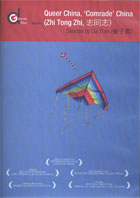
Queer China, ‘Comrade’ China 2008
Distributed by Frameline, 145 Ninth St., Suite 300, San Francisco, CA 94103; 415-703-8650
Produced by dGenerate Films
Directed by Cui Zi’en
DVD, color, 60 min. Mandarin with English subtitles
College - Adult
Gay and Lesbian Studies, Asian Studies, Gender Studies, Sociology, Media Studies, Law
Date Entered: 07/16/2010
Reviewed by Jason R. Harshman, The Ohio State UniversityDirector Cui Zi’en’s Queer China, ‘Comrade’ China is as much about the extent to which homosexuality is accepted under Chinese law as it is a primer for those interested in a theoretical analysis of homosexuality in China. The documentary blends, although sometimes roughly, a series of interviews with scholars and authors who debate the merits of the canonical publications related to homosexuality in China with the work of student activists at Beijing and Shanghai University between 1980 and 2008. As a result, it is apparent that while LGBT Chinese are united in their opposition to government censorship and the enforcement of laws that criminalize homosexuality, those same advocates are divided on how best to present their beliefs to the Chinese government. The argument for why homosexuality should be accepted in China appears to contain two camps: those who want to invoke empirical reasoning to defend the gay population in China and those who are concerned with appealing to opponents on a more emotional level.
The film dissects how the word tongzhi, meaning “comrade” in Mandarin, was re-appropriated by the gay community in China to mean “LGBT people” much in the same way as in the West the term “queer” was re-appropriated during the latter half of the twentieth century in order to take away the negative connotations insinuated by anything outside of hetero-normative behavior. The role of the West as influencing Chinese attitudes towards same-sex relationships is prevalent throughout the film. For most of Chinese history, incidences of homosexuality were limited to sexual acts, but this changed most significantly during the 1990s when homosexuality expanded to include sexual identity. Although the increased presence of Western culture at this time in Chinese history is one way of explaining this change, the issue of HIV/AIDS is cited more often by the interviewees as reason for why the debate and study of homosexuality in China intensified.
The latter part of the film focuses on the role student activists play in helping Chinese citizens feel more comfortable with their sexuality and the role mass media plays in creating a more accepting society. Despite the Chinese government’s persistence in breaking up repeated attempts by LGBT students to hold film and art festivals, most of the interviewees remain optimistic about the likelihood that same-sex marriage will be legalized and discrimination under the law will end. Queer China, ‘Comrade’ China offers arguments and insights uncommon in the Western debate regarding the rights of homosexuals and will serve as an engaging interdisciplinary resource for educators and students.
Awards
- Best Documentary, Turino GLBT Film Festival
- Best Documentary, Lisbon Gay and Lesbian Film Festival